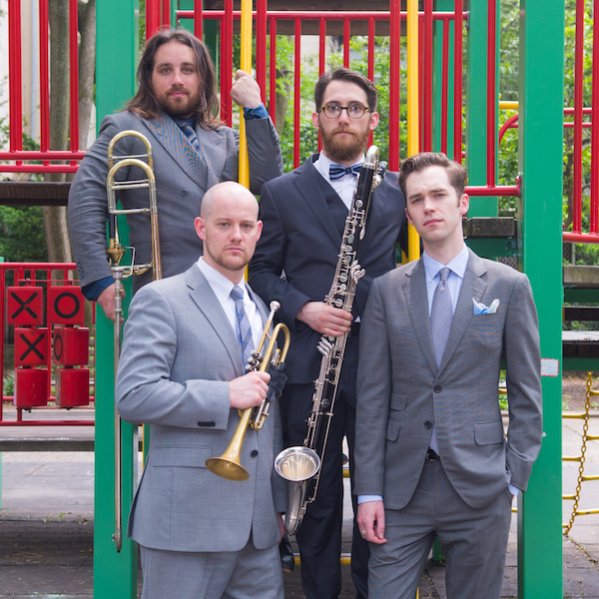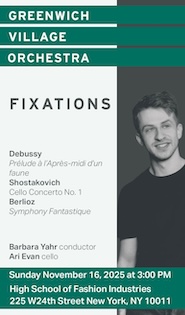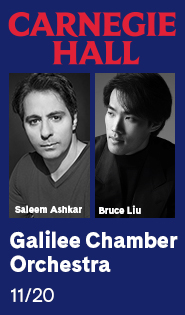Beglarian’s music makes the strongest impression in loadbang’s subdued program

loadbang performed Tuesday night at Roulette.
A loadbang is one of two things: a command to initiate a software action, which is sent upon loading; or the quartet of baritone Jeffrey Gavett, trumpeter Andy Kozar, clarinetist Carlos Cordeiro, and trombonist William Lang.
That one-of-a-kind instrumentation came together when the four were at the Manhattan School of Music—friends who decided to play together even though there was no music for them.
As of Tuesday night, the first of three concerts celebrating loadbang’s 10th anniversary, the group has now accumulated a substantial catalogue of original material from composers both inside and outside the quartet.
The series opener at Roulette featured music written for the group by others, an interesting and variable collection that showed some thinking that explored the opportunities that load affords, and thinking that treated the unusual mix of voices as just another quartet.
In the latter category were Charles Wuorinen’s Alphabetical Ashbery and excerpts from Hannah Lash’s Stoned Prince. Loadbang’s performances had a relaxed mastery, as was the case with the entire concert. But neither piece took advantage of the group’s special blend of sound; Gavett’s colorful, delicate baritone, the dark and warm low sounds of bass clarinet and trombone, Kozar’s precise trumpeting.
Alphabetical Ashbery is one of Wuorinen’s two settings of John Ashbery’s poems, and has the composer’s familiar atonality, free counterpoint, and forward flow. Along with that, the vocal settings show an arch appreciation for the poet’s humor, but Wuorinen’s highly intervallic language didn’t always maintain the poems’ lively cadences. Nor did the music move beyond his set style.
Stoned Prince is a monodrama, with a libretto by Royce Vavrek, that “examines moments in the public and imagined private life of Prince Harry.” It’s irreverent and entertaining, but less ambitious or insightful than one might expect. Lash’s work also uses loadbang in a straight voice-and-accompaniment role that showed no imagination for the ensemble. Gavett had a nice, unexaggerated absurdity in his performance, but the piece is one of the few forgettable items in loadbang’s repertoire.
Everything else performed Tuesday night was a fine demonstration of what the group can accomplish with its unusual resources.
Reiko Füting’s Land of Silence and Alexandre Lunsqui’s Guttural I & II dug into the pure sonic possibilities of the ensemble. Though text-based, using a poem by Kathleen Furthmann, Land of Silence had its strongest effect with voice and instruments circling around a single pitch, playing with dynamics, attacks, teasing and poking at the note as if it were a fascinating and possibly dangerous object, then using that process to gradually unfold the poem. It was something like the scene in 2001 when the primates are circling the obelisk.
Lunsqui embraced the simplicity of loadbang’s instrumentation, his music using the barest material: two repeated notes in Guttural I and timbre in Guttural II. The first part was played with rhythmic precision and a bit of swing that gave a drive to the group’s gossamer sound, while the second was like echolocation in a dark room, the sounds going out and defining the structure and dimensions of the piece.
Andy Akiho’s Six Haikus, presented via excerpts, took a different tack, featuring brief solos and duos from the instruments, with Gavett tapping out rhythms with a drum stick against a small gong. The players clearly enjoyed the strong rhythms and sharp, expressive writing—in the last of the three excerpts, the group transformed into a tight little percussion ensemble.
The deepest impression came from Eve Beglarian’s Island of the Sirens, an excellent exploration of loadbang’s possibilities and a lovely, imaginative piece in its own right. The music combined the instruments with audio made out of the processed sound of a flood warning siren along the Mississippi River. Using a Rilke text, the instruments play with the audio rather than from a straight score; the performance created the absorbing and mesmerizing sensation of limning the edge of the sirens’ song from the Odyssey, a gorgeous and eerie sound that one wanted to dive into, while also being wary of the trap.
One unexpected quality of the concert was loadbang’s relatively subdued demeanors. They play standing and usually are in full motion, bodies dipping and weaving with the music, a real band with an infectious enthusiasm. Tuesday night at Roulette they were, on their own terms, rather cool and staid in stage presence. One felt this was due to the stage’s separation from the audience, and the audience itself, which amounted to a disappointing baker’s dozen. With at least two critics, Füting, and some musicians in that complement, it seemed the hall’s dimensions sucked up a good amount of the mutual enthusiasm.
loadbang performs 8 p.m., December 5, in the crypt at the Church of the Intercession, and then plays music from their Commission Competition winners, 7:30 p.m., December 6, in the Jerome Robbins Theater at the Baryshnikov Arts Center. loadbang.com



